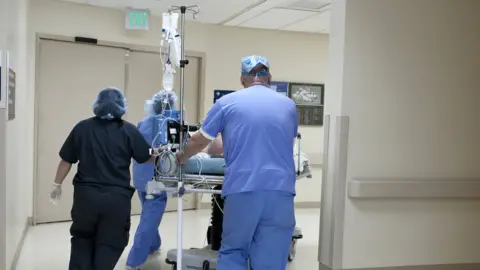Brain clots 'more likely' with Covid infection than vaccine
 Getty Images
Getty ImagesThe risk of developing a serious brain clot - known as a cerebral venous sinus thrombosis (CVST) - is 8 to 10 times higher in people with Covid than those who get a vaccine, a study suggests.
Based on US data, the Oxford research team says people being vaccinated should be reassured by the findings.
It follows investigations into links between the AstraZeneca vaccine and rare blood clots.
The study only looked at those who had had a Pfizer or Moderna vaccine.
The research, which involved electronic health records of 81 million people in the US, looked at the number of CVST cases seen in the two weeks following a diagnosis of coronavirus and the number of cases occurring in the two weeks after people had their first coronavirus vaccine.
It estimates that while these blood clots are uncommon after Covid - with 39 in every million people developing one within two weeks of being ill - they are much rarer still after a vaccine.
'Work in progress'
But researchers say their study - which has not been through a formal review and is separate from the Oxford vaccine group - is still a work in progress and must be interpreted cautiously because it is difficult to calculate with certainty how common CVSTs are in the general population, partly because of just how rare they are.
The study also found:
- Clots were more common in people who already had cardiovascular disease
- 80% of people who have the clots survive
- Some cases were seen in under-30s, showing they are not immune to serious complications from coronavirus
- In those who had an mRNA vaccine - such as the Pfizer or Moderna jab - they estimate CVSTs occurred in around four in a million people.
- Scientists say their study cannot identify whether vaccines are linked to these clots and much larger studies are needed to address this. They say a more complete database would be needed because as in cases it was unclear exactly which mRNA vaccine had been given
- There are no directly comparable figures for the AZ vaccine because this jab has not been used in the US
The European Medicines Agency says a particular type of CVST occurs in around five in a million people after the first dose of the Oxford-AstraZeneca vaccine - but the populations vaccinated were not the same as in the US and the rates cannot be compared.
Paul Harrison, professor of psychiatry at the University of Oxford, said their study had important conclusions for people deciding on vaccines.
He said: "Firstly, Covid-19 markedly increases the risk of CVST, adding to the list of blood clotting problems this infection causes.
"Secondly, the Covid-19 risk is higher than seen with the current vaccines, even for those under 30; something that should be taken into account when considering the balances between risks and benefits for vaccination."
From their database they were unable to investigate whether the CVST clots they were seeing had similar features to those seen in rare cases after vaccines - which all had a peculiar pattern of blood cells associated with them, where certain cells called platelets were diminished.
Prof Beverley Hunt, of Thrombosis UK, said the mechanisms behind people getting clots after Covid and those experiencing clots after vaccines were likely to be different.
She said: "Patients who are hospitalised with Covid-19 have very pro-thrombotic (sticky) changes in their blood, which persist after they have been discharged. This will lead to an increased rate of blood clots.
"The mechanism for the very rare blood clots and low platelet counts seen after the AstraZeneca vaccine is different. It is associated with an immune response."
